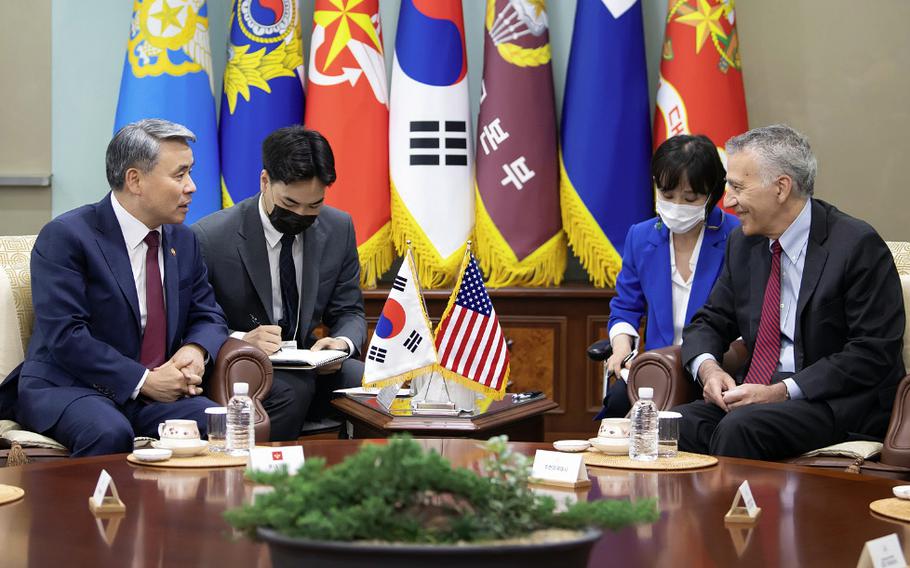
U.S. Ambassador to South Korea Philip Goldberg, right, speaks to South Korean Minister of National Defense Lee Jong-sup at the ministry's headquarters in Seoul, South Korea, July 21, 2022. (South Korea's defense ministry)
CAMP HUMPHREYS, South Korea — An unchecked China will continue “retaliatory actions” against the U.S. and South Korea, allies whose best defense is economic and security cooperation, the U.S. ambassador to South Korea said recently.
Ambassador Philip Goldberg, in an interview published Tuesday by South Korea’s Dong-A Ilbo newspaper, said China exerts economic pressure against other countries, including South Korea.
“All the people in the world are extremely concerned about China’s economic duress,” he said on Monday, according to the newspaper.
A career diplomat, Goldberg also served as ambassador to the Philippines from 2013 to 2016 and in 2018 as charge d’affaires in Cuba. He was confirmed for his current post in May 2022.
Goldberg recalled China exerting economic pressure on South Korea after the United States deployed a Terminal High Altitude Area Defense, or THAAD, battery there in 2016.
The U.S. and South Korea agreed to deploy the $800 missile-defense system at a South Korean military base in Seongju, roughly 130 miles south of Seoul, as a defense against North Korea, U.S. Forces Korea said in a statement at the time.
The decision prompted boycotts by China, an ally of North Korea and the South’s largest trading partner, of tourism, entertainment and Seoul-owned shopping malls in Beijing. The boycotts cost South Korea’s economy an estimated $7.5 billion, according to a 2017 study by the Seoul-based Hyundai Research Institute.
Goldberg said the THAAD deployment was a “sovereign action” by South Korea to protect itself from North Korean threats and that he believed "South Koreans know … that they need to make efforts to end economic coercion like this."
China during the THAAD incident showed “that retaliatory actions like this will continue when [the U.S. and South Korea] do not cooperate,” Goldberg said, according to the report.
"If economic coercion is put on the U.S. or its allies, we will fight back,” he said.
Goldberg’s comments follow the release of a joint statement from the leaders of the world’s industrialized nations rebuking China’s “non-market policies and practices, which distort the global economy.” The Group of Seven met over the weekend in Hiroshima, Japan, where China’s stance toward Taiwan and the Russian invasion of Ukraine were on the agenda.
“Our policy approaches are not designed to harm China nor do we seek to thwart China’s economic progress and development,” said the G-7 leaders from Canada, France, Germany, Italy, Japan, the United Kingdom and the U.S. “A growing China that plays by international rules would be of global interest.”
Goldberg echoed the G-7 concerns and said the U.S. wants “to maintain good relations with China.”
However, the U.S. “can’t just turn a blind eye to their behavior to ignore rules-based decisions and rules-based international order,” he added.
China’s Foreign Affairs Ministry in a statement on Monday described the G-7 statement as “high-sounding claims” and accused the U.S. of being “the real coercer that politicizes and weaponizes economic and trade relations.”
Stars and Stripes reporter Yoo Kyong Chang contributed to this report.